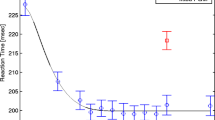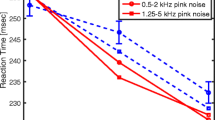Summary
A theoretical extension of Zwislocki's theory of temporal summation in hearing predicts that the growth of auditory sensation is faster than its decay. Hence the reaction time to the start of a tone ought to be faster than that to its end. Two experiments which investigated this hypothesis are described. Both experiments measured the reaction times of subjects to the start and end of an imperfectly detectable 1000-Hz tone embedded in continuous noise. All three subjects in Experiment I and three of four subjects in Experiment II revealed reaction-time differences in the expected direction; that is to say, the reaction time to the start of the tone was faster than that to its end. One subject in Experiment II did not show this difference, however, and this subject's anomalous behaviour is seen as a qualification to the general nature of the theory.
Similar content being viewed by others
References
Emmerich, D.S., Pitchford, L.F., Becker, C.A.: Reaction time to tones in tonal backgrounds and a comparison of reaction time to signal onset and offset. Percept. Psychophys. 20, 210–214 (1976)
Garner, W.R., Miller, G.A.: The masked threshold of pure tones as a function of duration. J. Exp. Psychol. 37, 293–303 (1947)
Goldstone, S.: Reaction to onset and termination of lights and sounds. Percept. Mot. Skills 27, 1023–1029 (1968)
Green, D.M., Luce, R.D.: Speed-accuracy trade off in auditory detection. In: Attention and performance, Kornblum, S. (Ed.), Vol. 4. New York: Academic Press 1973
Green, D.M., Birdsall, T.G., Tanner, W.P.Jr.: Signal detection as a function of signal intensity and duration. J. Acoust. Soc. Am. 29, 523–531 (1957)
Grier, J.B.: Reaction time to ‘tone off’. Psychonom. Sci. 5, 385–386 (1966)
Irwin, R.J., Kemp, S.: Temporal summation and decay in hearing. J. Acoust. Soc. Am. 59, 920–925 (1976)
Ludwig, H.: Technical note: an integrated circuit switch for auditory research. Med. Biol. Eng. 8, 319–322 (1970)
Miller, G.A.: The perception of short bursts of noise. J. Acoust. Soc. Am. 20, 160–170 (1948)
Munson, W.A.: The growth of auditory sensation. J. Acoust. Soc. Am. 19, 584–591 (1947)
Penner, M.J.: The perception of offset: a problem of decision criteria. Percept. Psychophys. 17, 587–590 (1975)
Plomp, R., Bowman, M.A.: Relation between hearing threshold and duration for pure tones. J. Acoust. Soc. Am. 31, 159–167 (1959)
Robinson, C.E.: Simple form of the auditory running-average hypothesis: Application to the temporal summation of loudness and to the delayed perception of the offset of brief stimuli. J. Acoust. Soc. Am. 55, 645–648 (1974)
Watson, C.S., Gengal, R.W.: Signal duration and signal frequency in relation to auditory sensitivity. J. Acoust. Soc. Am. 46, 989–996 (1969)
Zwislocki, J.J.: Temporal summation of loudness: an analysis. J. Acoust. Soc. Am. 46, 431–441 (1969)
Author information
Authors and Affiliations
Additional information
This research was supported by a grant to R.J. Irwin from the Golden Kiwi Scientific Research Distribution Committee and from the University of Auckland
Rights and permissions
About this article
Cite this article
Kemp, S., Irwin, R.J. Reaction time to the start and end of weak signals in noise. Psychol. Res 40, 367–376 (1979). https://doi.org/10.1007/BF00309417
Received:
Issue Date:
DOI: https://doi.org/10.1007/BF00309417




